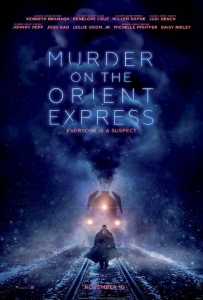Great scenery? Check. A-List casting? Check. A script based on one of the greatest murder mysteries of all time written by an author universally acknowledged as ‘The Queen of Crime?” Check. A totally fresh and revamped adaptation of a classic that lives up to it’s predecessors? To quote Hercule Poirot, “Non.”

Full confession: I did grow up watching the 1974 Albert Finney version, which kind of (maybe sort of) got me hooked on murder mysteries. I went to see Branagh’s version knowing who the culprit was and where most of the clues lead; I had to prepare myself with the fact that the reveal probably wasn’t going to be as exciting or mind blowing as the first time I’d seen it. With this in mind, I have to say those who do not know the answer to the mystery may enjoy this film more than someone who does, as the interest in the murderer’s identity will motivate them to keep watching.
Kenneth Branagh did to Hercule Poirot what Robert Downey Jr. did to Sherlock Holmes, which was essentially upgrade him from odd, dapper genius, to genius-gentleman-action-hero with a love interest. Which is fine— to each their own interpretation and revamping— except for one problem: Murder on the Orient Express is not an action film. The use of the Imagine Dragons song in the teaser trailer should have been my first clue that this movie was going to be pitched to audiences as something it really wasn’t.
At it’s core, Murder on the Orient Express is a delicate puzzle that requires the detective and the audience to use their ‘little grey cells’; to take a slew of seemingly unrelated clues and occurrences, and piece them together, until the very end, when all is revealed. Now, if you want to change things up, add in some action, a little flair, go for it. But don’t sacrifice valuable screen time that could have been used for sleuthing and deducing for the sake of a chase scene that literally leads nowhere. There are so many instances where clues are pulled out of thin air, confessions are made with barely so much as a threat, and a couple of the suspects (the lesser known actors) are passed over in favor of other suspects (the top billed cast), which made me wonder if there had been scenes edited out of the final cut.
I do have to give credit where it’s due; in this case, it’s to the cast. Everyone who had a part to play fully embodied their characters, taking full advantage of their time onscreen, no matter how short it was. A special kudos has to be given to Michelle Pfeiffer, (but is anyone really surprised? It’s Michelle flipping Pfeiffer) who is simply fabulous in her role as Mrs. Hubbard, and to Kenneth Branagh. I may not agree with his portrayal of Poirot, but he really stuck to his choices of characteristics and gave it all of the energy his six-pointed mustache could muster.
Looking back on my viewing experience, I realized that it wasn’t that the embellishments on the plot and the new characters that were bad; some of them actually added a new depth to the story. However, others just weren’t executed as well as they could have been, which caused them to pale in comparison to the intelligence of film’s source material. Bottom line, I recommend that you either read the book first or watch the 1974 version (or even the television adaptation starring David Suchet, Jessica Chastain, and Toby Jones) before learning who the murderer on the Orient Express is in Branagh’s version.
